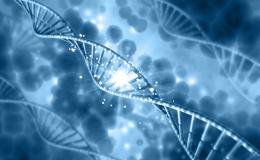Is Colon Cancer Hereditary?
July 6, 2020
Colon cancer is the third most common cancer diagnosed in the United States, with the exclusion of skin cancers. The lifetime risk of disease development is 4.1% for women and 4.4% for men. Despite the disease’s prevalence, many people are unaware of the symptoms of colon cancer and whether or not the disease is hereditary, or can run in families. Here, we describe colon cancer, including its symptoms, causes and therapies, and the prevalence of and gene mutations associated with hereditary forms of the disease.

Symptoms
Colon cancer typically begins as small clusters of noncancerous cells, called polyps, that form in the colon and may eventually develop into cancer. Interestingly, early stages of colon cancer often have few symptoms, but symptoms can include:
- A long-term change in bowel habits, including diarrhea or constipation or other change in stool consistency
- Abdominal pain, gas or cramps
- Blood in stool or originating from the rectum
- Fatigue or weakness
- Unexplained weight loss
- A feeling that your bowel has not completely emptied
It is important to remember that symptoms for colon cancer can vary widely, depending on the stage of the cancer and its location in the colon.
Causes
It is unclear what causes most colon cancers. Cancer develops when a normal cell acquires many changes in its DNA that affects how the cell grows and divides. Normal cells exhibit controlled cell division, whereas cancer cells divide uncontrollably, eventually forming a tumor and potentially moving, or metastasizing, to other parts of the body. While it is not always clear what causes colon cancer, research has identified many risk factors that can increase the likelihood of developing the disease. The risk factors for colon cancer are numerous, and include:
- Advanced age
- African-American race
- Inflammatory bowel conditions
- Personal history of polyps
- A family history of colon cancer
- Sedentary lifestyle
- Being overweight or obese
- High-fat, low-fiber diet
- Smoking
- Heavy alcohol use
Additionally, some colon cancers are inherited and are due to mutations in specific genes that cause hereditary cancer syndromes. We will discuss these syndromes in more detail in a subsequent section.
Screenings
As mentioned earlier, early stages of colon cancer and small polyps often generate very few symptoms, requiring patients to undergo regular colonoscopies, a procedure that allows a physician to see the inside of the colon, to establish the presence and monitor the growth and development of noncancerous polyps and colon cancer, starting around age 45 or 50. People with an increased risk of colon cancer and those with a family history of the disease should initiate screenings at an earlier age. It typically takes between ten and fifteen years for a benign (noncancerous) polyp to develop into colon cancer, and physicians can remove polyps before they progress to cancer. Fortunately, colonoscopies also allow physicians to detect cancer at earlier stages, when the disease is likely more treatable.
Treatments
The treatments used for colon cancer depend on how advanced the cancer is and where it is located in the colon and other places in the body. In some cases, small, localized areas of cancer at early stages may be removed during a colonoscopy. For more advanced stages of colon cancer, other surgeries may be required. Chemotherapy, immunotherapy, radiation and/or targeted drug therapy can also be used to kill cancer cells with the goal of shrinking tumors and slowing the spread of disease.
Hereditary Colon Cancer
A small percentage of individuals have inherited gene mutations, or gene “misspellings,” that significantly increase their risk of developing cancer. These gene mutations cause hereditary cancer syndromes where DNA mutations are passed from an affected parent to their child. Depending on the mutation and the mutation’s effect on a gene’s function, a hereditary cancer syndrome can increase the risk of a variety of different cancers, including colon cancer. Physicians typically suspect hereditary forms of colon cancer in individuals that are diagnosed at an unusually young age or those with a strong family history of disease.
It is estimated that between five and ten percent of colon cancer cases are due to hereditary forms of the disease. The two major hereditary cancer syndromes associated with an increased risk of colon cancer are Lynch syndrome, caused by mutations in the MLH1, MSH2, MSH6, PMS2 or EPCAM genes, and Familial Adenomatous Polyposis (FAP), which is caused by mutations in the APC gene. Other gene mutations have also been associated with an increased risk of developing colon cancer. Individuals with hereditary cancer syndromes associated with an increased colon cancer risk are typically screened for polyps and colon cancer at a younger age in order to more closely monitor disease development and detect cancer at an earlier, more treatable stage, depending on the specific gene mutation.
With any cancer, understanding an individual’s risk of developing specific cancers is integral to effective disease screening and early disease detection. Hereditary cancer tests, such as the Kailos Genetics ExpedioTM Hereditary Cancer Screening, screen for many different mutations in a panel of genes associated with an increased risk of colon and other cancer development, allowing patients and their physicians to respond effectively to inherited gene mutations that may adversely affect a patient’s health. Click here to learn more about ExpedioTM or contact us with any questions you have regarding our products.




